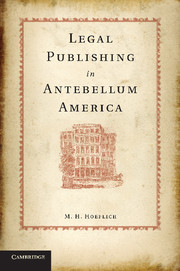Book contents
- Frontmatter
- Contents
- Preface
- Bibliographical Note
- Introduction
- 1 A Bookish Profession
- 2 Birth of the Law Book Trade
- 3 Spreading the Word: Catalogues and Cultivation
- 4 Bidding for Law Books
- 5 Risk, Subscriptions, and Status
- 6 John Livingston, Esq.: Law Bookseller as Cultural Entrepreneur
- 7 Conclusion: Selling the Law in Antebellum America
- Index
- References
1 - A Bookish Profession
Published online by Cambridge University Press: 04 August 2010
- Frontmatter
- Contents
- Preface
- Bibliographical Note
- Introduction
- 1 A Bookish Profession
- 2 Birth of the Law Book Trade
- 3 Spreading the Word: Catalogues and Cultivation
- 4 Bidding for Law Books
- 5 Risk, Subscriptions, and Status
- 6 John Livingston, Esq.: Law Bookseller as Cultural Entrepreneur
- 7 Conclusion: Selling the Law in Antebellum America
- Index
- References
Summary
In 1848 Rufus Choate made a motion before the Massachusetts Supreme Court for the admission of his student and protégé, Matthew Hale Carpenter. Carpenter was duly admitted and began his preparations to leave Boston for Wisconsin in the hopes of building a professional and personal life in this frontier state. Upon learning of his student's decision, Choate's first question to Carpenter was whether he had enough money to equip himself with an adequate professional library to bring with him to his new home. When Carpenter replied that he had not and that “the idea of going to a new country as an attorney with no books” had been a great worry, Choate immediately told Carpenter to go to Little, Brown & Co., establish a credit line, which Choate himself would guarantee, and buy a library. Delighted with this offer, Carpenter did so and soon returned to Choate with a list of the books he had purchased. Choate looked at the list and scolded Carpenter that he had been too parsimonious. He sent Carpenter back, and this time Carpenter spent almost $1,000 on his new professional library.
In December 1825, Charles Augustus Dewey, a young lawyer and Harvard graduate living in Williamstown, Massachusetts, wrote a letter to I. L. Bangs, proposing that they consider becoming law partners. His greatest concern in forming this union was the question of offices.
- Type
- Chapter
- Information
- Legal Publishing in Antebellum America , pp. 4 - 29Publisher: Cambridge University PressPrint publication year: 2010



